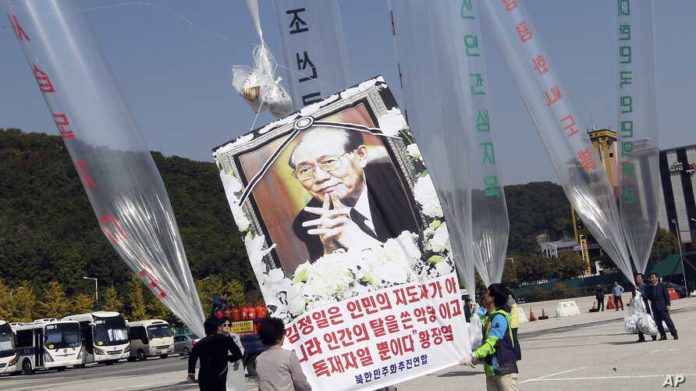After the recent U.S.-ROK summit, South Korea’s Democratic Party (DP) and main opposition People Power Party (PPP) are interpreting the results on North Korea policy completely differently.
Gyeonggi Gov. Lee Jae-myung, who is the DP’s leading presidential hopeful, once again emphasized the importance of implementing the so-called “anti-leaflet” law that went into effect in March in light of the summit. “It is an unavoidable measure to protect more freedom and lives by restricting certain ways of expression that lead to violence and military conflict,” Lee said. “It also is a part of following agreements with North Korea that were aimed at ending the confrontation.”
The Gyeonggi provincial government announced last week that it would seek to block all attempts to fly anti-Pyongyang leaflets by balloon across the inter-Korean border by ramping up enforcement of the ban on such activities.
Kim Gi-hyeon, floor leader and acting leader of the PPP, argued that “the Moon Jae-in administration should abandon its double standard toward human rights issues and move forward proactively to solve North Korean human rights issue.” And referring to the ‘anti-leaflet law’ Kim added: “The Moon administration restricted freedom of expression that is guaranteed by the constitution following North Korea’s continuous requests.”
Kim mentioned the latest event, in which South Korean police executed a search and seizure warrant at the office of activist Park Sang-hak’s anti-North Korea group. Kim said, “we urge the government to immediately stop persecuting Park Sang-hak’s human rights.” Park is accused of sending 500,000 leaflets from near the demilitarized zone into North Korea in April.
One of the key reasons why the two parties have conflicting views is that they are emphasizing different parts of the joint statement between President Joe Biden and President Moon Jae-in.
The PPP focuses on the part of the statement that says “We agree to work together to improve the human rights situation in the DPRK and commit to continue facilitating the provision of humanitarian aid to the neediest North Koreans,” and, “As democracies that value pluralism and individual liberty, we share our intent to promote human rights and rule of law issues, both at home and abroad.”
The ruling DP, on the other hand, gives priority to the part of statement that says that both sides “reaffirm our common belief that diplomacy and dialogue, based on previous inter-Korean and U.S.-DPRK commitments such as the 2018 Panmunjom Declaration and Singapore Joint Statement, are essential to achieve the complete denuclearization and establishment of permanent peace on the Korean Peninsula. President Biden also expresses his support for inter-Korean dialogue, engagement, and cooperation.”
The DP and leftist commentators in South Korea emphasized the fact that the statement included the 2018 Panmunjom Declaration between the two Koreas as giving Washington’s consent for Seoul to proceed with the agreement unilaterally.
The Panmunjom Declaration states that “the two sides agreed to completely cease all hostile acts against each other in every domain including land, sea and air that are the root cause of military tension and conflicts.”
It also read, “For the present, they agreed to stop all the hostile acts including the loud-speaker broadcasting and scattering of leaflets in the areas along the Military Demarcation Line (MDL) from May 1, to dismantle their means, and further to transform the DMZ into a peace zone in a genuine sense.”
This clause was one of the key reasons behind the anti-leaflet law. South Korean media outlets reported the government source as saying that the United States was initially uncomfortable with including the inter-Korean Panmunjom Declaration in the joint statement, but that it eventually accepted the South Korean government’s request.
South Korean Unification Minister Lee In-young also welcomed the summit results and said, “we have created a sufficient environment to step forward to resume talks with North Korea and to pursue peace” on May 24. He added that “the joint statement sufficiently reflected the spirit of improving relations with North Korea autonomously and unilaterally.”
The DP also expressed its intent to ratify the Panmunjom Declaration at the National Assembly. “The best results have come out from the summit when it comes to the North Korean policies,” said DP leader Song Young-gil on May 24. “We will cooperate closely with the government about ratifying the Panmunjom Declaration.”
The Panmunjom Declaration needs ratification from the National Assembly to fully enter into effect.
Article 21, Section 3, of the Development of Inter-Korean Relations Act states that “The National Assembly shall have a right to consent to the conclusion and ratification of South-North Korean agreements which place heavy financial burdens on the State or nationals, or South-North Korean agreements concerning legislative matters.”
It is reported that the Unification Ministry has almost finished preparing for the ratification process. “The ratification process is not only the National Assembly’s obligation, but also its right,” said Minister Lee In-young. He said it is essential to implement agreements between the two Koreas without being affected by other political situations and regional issues.
The Panmunjom Declaration includes many controversial ideas, such as declaring an end to the Korean War and replacing the Armistice Agreement with a peace agreement. However, the only thing that was physically achieved from the declaration was the establishment of an inter-Korean liaison office in Kaesong. However, North Korea demolished this office in June 2020, a few days after Kim Yo-jong, the North Korean dictator’s sister, made threatening remarks to defectors in South Korea for sending items across the border.
There are also concerns that domestic law and international law will clash if the Panmunjom Declaration is ratified. “If it is ratified, South Korea will be able to provide goods to North Korea for humanitarian purposes,” said Nam Sung-wook, professor at Korea University, in an interview with the Seoul Economic Daily newspaper. “International law currently bans such activities, and it could cause confusion if domestic law is the only thing (that) changes. It could also lead to neutralizing international sanctions toward North Korea.”


